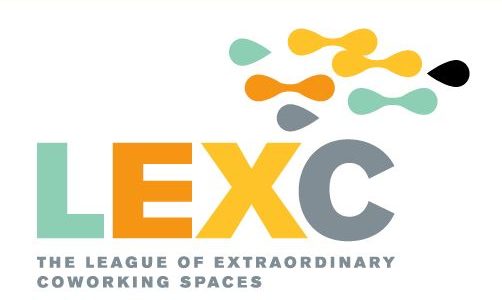Last week, I wrote a quick report about a new coworking space network for Shareable.net. The network, with the slightly cheesy name of “The League of Extraordinary Coworking Spaces,” or LEXC for short, was designed to provide a seamless coworking experience for mobile professionals on the go in the United States.
Here’s a little excerpt of the Shareable article:
.”..Traveling, a common requirement for remote and freelance professionals, presents a unique problem for coworking regulars. Not only can it be arduous to locate a coworking space in a new city, but drop-in fees can be an unwelcome expense.
For years coworkers have longed for a streamlined way to access coworking spaces around the world without worrying about membership cards and extra costs. And now it seems that something has arrived.
LEXC is a unique network of coworking spaces with a common standard of excellence. LEXC venues have come together to provide, for the first time, a seamless coworking experience in cities around the US. At long last, members of any LEXC venue now enjoy trusted access and full privileges at any other venue in the network. If you’re a member of one LEXC venue, you’re now a member of all LEXC venues.”
As I shared the piece with my coworking colleagues via social media, I was slightly surprised to see a less than enthusiastic response to this news.
“Oh, I didn’t realize that there were 6 spaces better than the rest,” stated one friend.
“Feels exclusive to me. Concerned about one group determining what spaces are ‘qualified,’” tweeted another.
While I tend to automatically embrace anything that makes it easier for individuals to access the global coworking community, I realized that these cynics had a point: no where on the LEXC.org site did it state what made a coworking space “excellent” or how they had decided which six spaces to include at launch.
Coming from a global community that embraces coworking in many different shapes and sizes, and that in general rejects hierarchy or exclusivity, these were valid concerns. In the interest of clarification, I decided to ask LEXC to provide some insight into the criteria by which they’ll be judging applicants, and what they’re doing to ensure that LEXC is truly about enhanced access for traveling coworkers and not just about a “club” for coworking spaces that have the best funding/amenities.
According to Bill Jacobson of WorkBar in Boston, a few of the things that define LEXC locations include:
- all are in the prime business of running a coworking space — this isn’t a side project of another main tenant of the space.
- all provide a mix of hotdesk and dedicated workspaces.
- all are professionally managed by full-time, dedicated personnel.
- all thrive on being a diverse community of professionals interested in joining a coworking space to hone and share their skills as much as a place to grow their business.
- all are committed to providing a combination of workspace, events and education to support members and the surrounding community.
“Hopefully that explains what we mean when we say ‘excellent,’” said Jacobson. “By it, we express that a venue is a truly excellent example of a coworking space. Any qualitative criteria are ultimately subjective, but it’s quite reasonable to say that not all coworking spaces fit these criteria. It’s also reasonable to say that these criteria can make any coworking space better. These are finally, characteristics that we want LEXC members to uniformly expect no matter where they choose to work.”
So it would seem that LEXC’s position is not so much about exclusivity or hierarchy but rather, about offering the user community a dependable experience from the user’s point of view. It’s user-centric versus provider-centric. That’s an important distinction, with emphasis on trust and dependability for the coworkers themselves.
“LEXC is not as much about hierarchy as it is about aspirations and standards,” added Jerome Chang of BLANKSPACES. “Our aim is simply to provide a great experience. With a fast-growing and increasingly mobile user community and so many different coworking spaces out there, the founding spaces felt we all believed in achieving the same ideals in similar ways. We offer the coworking community a dependable and rewarding experience wherever they find us. This includes everything from ease in locating and booking workspace, to maintaining a clean, friendly, professional environment with commercial grade furnishings and furnishings and infrastructure. We look forward to having others join us who share the same collection of ideals, from service and culture to operations and environment.”
In light of these clarifications, I’d like to re-pose my original question: What do you guys think about LEXC? Does it make coworking spaces more accessible or exclusive? Share your thoughts in a comment or message me on Twitter.
